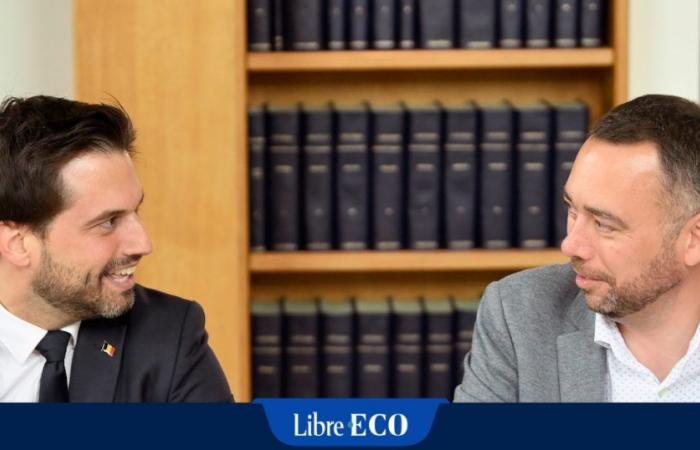
What will be the fate reserved for inheritance rights, in Wallonia, by the future MR-Les Engagés coalition? A tax presented as “unfair” by Les Engagés – because it is often avoided in the richest families through estate planning and in particular donations. But also deemed “prohibitive” by the MR during the campaign.
Everyone therefore had their own proposal in their electoral program. The Committed voted for the elimination of inheritance tax and their replacement by a “fixed duty” (between 4 and 5%) during any transfer of capital, with a reduction for the first 100,000 euros. Initially, the MR wanted to both reduce the rates of inheritance tax (up to a maximum of 50%) and their progressiveness, but also to relax the exemption conditions relating to the principal residence of spouses and legal cohabitants. The MR also announced that it wanted to fiscally favor the generation jump (from a grandparent to a grandchild) during an inheritance. But if we are to believe the latest statements from Willy Borsus (MR), the liberal party could line up behind the more radical proposal of the Engagés, namely a single rate for all capital transmission operations.
MR and Engagés confirm their intention to reduce inheritance taxes
1. What is the current system?
In the Walloon Region, each heir is taxed separately on the amount they receive. Inheritance taxes are therefore calculated per person, with progressive rates depending on the degree of relationship and the amounts (per tranche). The lowest rate is 3%, for amounts less than 12,500 euros for a direct line inheritance. The highest rate is 80% for an heir unrelated to the deceased, above 75,000 euros. Exemptions and reductions exist. Thus, the surviving spouse or legal cohabitant benefits from an exemption on the building which served as their main residence, if the deceased person had lived there for at least five years.
The movable donation tax (registered with a notary) in Wallonia is 3.3% (direct line) and 5.5% (others). A manual movable donation (unregistered) does not give rise to any payment of duty if the donor does not die within 5 years.
2. What would the new system change?
First expected consequence: a large number of heirs, in modest families, would undoubtedly escape paying inheritance tax, given the reduction of 100,000 euros. Two: registered donations, which are currently on the rise (up nearly 30% in 4 years), would undoubtedly be fewer because the resulting tax advantage would become less significant compared to a transfer right of capital of 5%. Money would therefore undoubtedly circulate less quickly within families. Three: a single rate would encourage giving (or leaving an inheritance) to more distant or even unrelated people (while respecting the reserved shares of the spouse and children, of course). Four: associations and foundations would be less favored by the new system, they who today often escape tax thanks to reductions and more favorable rates.
3. Is such a reform fair and payable?
We asked this question to the economist (labeled Ecolo) Philippe Defeyt. For him, some justify a possible reform with questionable arguments: “We have to look at the figures: when we say that inheritance taxes are prohibitive, we forget a little quickly that the vast majority of inheritances in Wallonia are made in a direct line (nearly 90,000 out of approximately 112,000 for the last figures available), giving rise to a fairly light average taxation (from 6.2% to 7.7%; source: SPF Finances). There are therefore very few heirs who pay very high inheritance taxes. On the other hand, supporters of reform say that the same amounts are taxed twice, at the time they are received and at the time of death. But it’s a bit quick to forget that a large number of people have made their fortune in Belgium thanks to the untaxed capital gains they have made.”.
Everything you need to know about inheritance
And on the question of the budgetary sustainability of the reform, Philippe Defeyt also has serious doubts, taking into account the situation in which Wallonia currently finds itself: “Currently, inheritance taxes paid bring in approximately 758 million euros in revenue to Wallonia. Tomorrow, if we apply a single duty for the transfer of all capital of 5%, and considering that things remain as they are in terms of behavior and reductions, these revenues will drop to just over 301 million d euros per year. There would therefore be a shortfall of nearly 457 million euros for the Region which would need to be compensated”. And this amount is undoubtedly underestimated, depending on the possible introduction of a reduction of up to 100,000 euros – according to the Engagés, 40% of heirs would no longer pay anything – and if the donations recorded (receipts of 167 million in 2023) turn out to be less numerous.
4. What about compensation?
Inheritance taxes therefore represent a significant part of Wallonia’s total revenue (excluding loans) (around 17 billion euros), or around 4.5%. How do the MR and Les Engagés plan to go about compensating for this shortfall? “In their program, Les Engagés hope that there will be more declarations since there would be less interest in making tax arrangements; yes, perhaps, but if these arrangements are legal, it will always remain interesting to avoid the transmission tax; and if not, we would have to fight against these montages. As for a tax on capital gains, put forward by Les Engagés as an element of compensation, it should be decided at the federal level; but nothing says that this proposal will pass, and even if it did, the amounts collected would be collected by the federal government, and not by Wallonia.”
Conclusion of the economist: “Balance does not seem to me guaranteed for Wallonia’s public finances. Certainly, some are counting on long-term effects, and in particular on the fact that people from Brussels and Flemish could come and set up their tax domicile in the south of the country. But before recovering 500 million euros, many people will have to move to the south of the country,” he quips.





